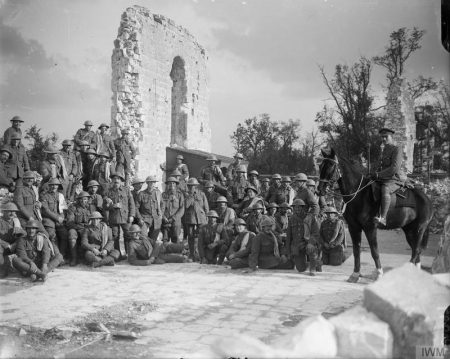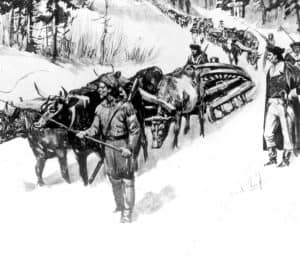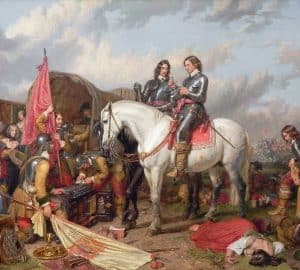
Harry Wisbey kissed his wife and squeezed his little children to his heart. It was early dawn on August 13, 1914. The “Great War” was now raging in Europe, and Harry Wisbey would soon be setting out from his home in Northern Ireland to do his part. At breakfast, he read the Bible to his family and fell to his knees to pray. He wrote later in his journal, “To commend your dear ones into God’s keeping for one knows not how long, is very hard indeed.” His voice was so choked with emotion that it was hard for the father to pray. Harry’s little boy, too young to know the gravity of the situation, said merrily after family prayers, “Dada prayer very funny this morning.” It was time to be off to the Railway Station to meet the Suffolk Regiment and board the trains for Dublin. Harry Wisbey was much older than most of the men of the Suffolk Regiment. He was not an ordinary soldier. He had already served his country in the ranks, and had combat experience in the Boer War in South Africa.
Harry was an Army Scripture Reader, a special group of men, all veterans of the British army and navy, who volunteered their time to bring God’s Word to the rank and file of the British Service. They worked alongside the chaplain’s corps to pass out Gospel literature, distribute Bibles, pray with the soldiers, visit the sick and wounded, and even to give the Gospel to captured prisoners! Harry Wisbey suffered alongside the privates during their transport across the English Channel to Havre. A veteran of many voyages, he did not succumb to seasickness like many of his inexperienced comrades. During the short voyage, he prayed with many apprehensive men, pointing them to the merits of the Lord Jesus Christ, the only sure anchor of the soul.
The Suffolk Regiment arrived in France just in time for a rainstorm that turned the roads into a river of mud. Without topcoats and soaked to the skin, they trudged along toward the roar of artillery. At night, Harry Wisbey slept in the mud with the men of his regiment, knowing that he must “endure hardness as a good soldier of Jesus Christ.” In his journal, he thanked the Lord for many excellent opportunities to talk to the troops about their soul’s eternal destiny.
Wisbey’s journal contains many details that give a glimpse into the life of an Army Scripture Reader. He was grateful to get some plums from a kind French farmer. He enjoyed a cold water bath provided in a large washtub behind a farmstead. He talked about the cheer imparted by one cup of strong hot coffee. He was extremely grateful for an elderly French woman who offered to wash his socks. He described the sounds of mice and rats tunneling through the hay loft that was his welcome lodging for a night.
On the morning before reaching the trenches, Harry had the opportunity to preach to the regiment from the text, “Christ Jesus came into the world to save sinners.” Tears of repentance flowed down many a muddy cheek on that memorable morning. On August 20, 1914, exactly one week after leaving Ireland, the Suffolk Regiment was deployed on the front lines near the village of Mons. Harry Wisbey was with them, asking men about the state of their souls even as the roar of German artillery filled the air with an ominous sound, reminding sinners that eternity was nigh. The war was going badly for the French and the British in the summer of 1914. The German advance on Paris was grinding forward as a hopeless desperation gripped the countryside.
By August 25th, the Suffolk Regiment was in retreat. Harry Wisbey walked alongside the stretchers carrying men torn apart by awful wounds. One poor boy was shot through the jaw and neck, and could only squeeze Wisbey’s hand in affirmation when he was asked if he was trusting in the blood atonement of Jesus Christ.
Wisbey’s unit narrowly escaped capture by a troop of German cavalry on August 27. One brave private, shot through the head, walked on his own feet toward the hospital, leaning on Wisbey’s arm. Wisbey marveled at the courage and steadfastness of the wounded men. He remarked in his journal how some of the slightly wounded men screamed in agony over trifles while the desperately wounded men exhibited cool courage as they went through the Valley of the Shadow of Death.
By August 28, Wisbey was working among the men in the hospitals near Rouen Station. He had been separated from the Suffolk Regiment in the confusion of the retreat, and did not know, in the fog of war, how to find them again. He determined that Providence had put him among the wounded men, and that the hospitals demanded his attention for the time. He was blessed to see many of the wounded lads put their faith and trust in the Savior of the World.
On September 3rd, Wisbey had an opportunity to write to his wife, informing her that he was still in the land of the living. Wisbey was always encouraged to meet fellow soldiers and officers who were committed Christians. Sometimes they sang hymns together or exchanged addresses to write to one another after the cruel war was over. One young Scottish lad whose fellowship Wisbey enjoyed was with the famous Black Watch. A kind and Godly colonel also befriended Harry Wisbey and encouraged him in his work among the troops.
On the morning of September 4, Wisbey was moved to see hundreds of French civilians, old men and boys, called up to defend their homes and farms from the German onslaught. He wrote in his journal, “May God speed the time when wars shall cease.”
On September 7th, Wisbey was informed by Colonel Miller that he would be granted a furlough to return home to visit his wife and children and to work with wounded men in the hospitals at home. Wisbey, worn out from over a month with little food and little sleep, was grateful for the unexpected opportunity. He had planned on being in France longer than this. On the voyage back across the English Channel, Wisbey traveled in the company of some German prisoners of war. They had many cordial conversations, and there were some Christians among the German prisoners. One devout young German soldier gave Wisbey his own pocket watch in exchange for Wisbey’s watch, a means by which they could remember their fellowship in the Lord and pray for one another for as long as they lived. On September 10, 1914, Wisbey wrote in his journal these lines of joy, “Now I am at Home Sweet Home! Found all well, and my dear wife’s face rewarded me. God be praised!”
This mission was not the end of Wisbey’s service as an Army Scripture Reader. Far from it. He would see action again. In fact, he finally retired as an Army Scripture Reader in 1951, at the age of 75. During his long years of service, he personally shared the good news of Christ and His Gospel to thousands and thousands of men, serving troops as an Army Scripture Reader in both World Wars and rejoicing to see many soldiers and sailors trusting in Christ. The SASRA (Soldiers’ and Aviators’ Scripture Readers Association) still carries on their noble work to this day. May God be praised that His Word never returns void, but always prospers wherever it is sent forth.
Bibliography
Rough Journal of Army Scripture Reader H. Wisbey with the Suffolk Regiment and published by SASRA




